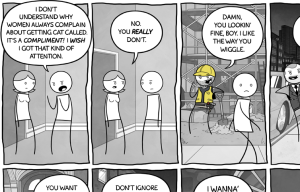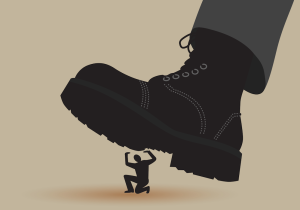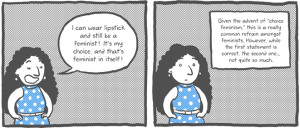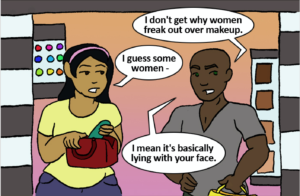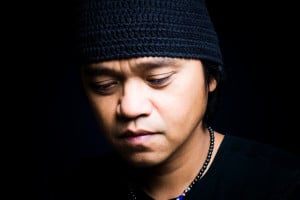Originally published on The Establishment and republished here with permission.
(Content Warning: invasive questions, fetishization of trans women, mention of genitals in relation to gender, trans-hateful slurs)
As a trans woman, I’m no stranger to fetishizers.
My OKCupid inbox, Plenty of Fish messages, and Twitter DMs are always full of messages with invasive personal questions : “How big are you? Are you functional? Are you cut?”
I experience a similar phenomenon in real life as well.
Walking down the street, for instance, a guy will say hello to me, and I’ll say hi back. But this is where the standard greeting etiquette ends – with him jumping immediately to “I’ve been with tr*nnies, so I know you’re one,” and asking me to have sex with him because he says he wants me.
Such fetishizers view me – a trans woman with a penis – as merely a sexual object.
To be clear, sexual freedom is important.
Though the mainstream public may – still – largely disagree. In general, fetishes are neither necessarily positive or negative. At its core, a fetish is simply a sexual focus on something that isn’t usually or inherently sexual – like feet or pain.
As a proud masochist, I would never want to shame anyone for their kinks. But the truth is that not all fetishes are benign. When fetishizers obsess over “types” of people – such as trans women, specific races or ethnicities, and/or fat people – we’re forced into stereotypes, treated as objects of worship instead of humans in all of our complexities.
Those who pack my OKCupid inbox with intrusive questions and fawning messages would lose their attraction to me were I to alter my birth genitals. They belong to a group of people who often call themselves “trans-amorous,” or “trans-attracted,” or “tr*nny chasers” – people who are attracted to trans women with intact penises.
Such people are not, however, attracted to the humanity behind the anatomy.
Even the phrase itself – “trans-attracted” – demonstrates how this fetish is inherently transmisogynistic. If those who identify with this label saw trans women as real women, they wouldn’t need a word to differentiate us from other women in order to explain their attraction to us.
And yet, many of these fetishizers call themselves allies. A frightening number of fetishizers, in fact, have asserted that they are my allies because they want to throw themselves – sometimes literally – down at my feet.
Trans fetishizers often perform love on multiple levels.
On an individual level, they befriend or romance us, feigning care and affection. On a societal level, they partake in ally theater in order to create the illusion that they care about us as people and our rights as a whole. But their love can quickly turn into hate – especially if we turn down their sexual advances.
Just because a fetishizer poses as an ally and learns about our communities doesn’t mean they’ll stop contributing to violence against us.
I’ve known far too many trans women who’ve been violently harmed by “trans-amorous” men to believe that they’re capable and dependable allies. My friends, fortunately, have so far survived these emotional and physical attacks.
But not everyone does, made devastatingly clear by the epidemic level of murders against trans women, especially trans women of color.
The trend of playing the role of an ally to gain access to certain populations is by no means, sadly, unique to the trans community. The phenomenon also plays out, for example, among men who have fetishes for women of color and learn about anti-racism, while secretly continuing to be racist and harboring race-play fantasies.
I know other women of color who have had their hearts broken by fetishizers who treated them as sexual objects based on their race without ever truly loving them.
Many of these men had echoed anti-oppressive language and sentiments – and certainly had no problem having sex with women of color – but ultimately, they were enacting violence in the form of racism.
Fetishizers posing as allies use all the buzzwords.
They speak on panels about “loving” trans women and supporting the trans community. They do everything they think an ally is supposed to do, but it’s all rooted in problematic sexual goals.
Some of these speakers and supposed activists have been known to harm or fetishize trans women, but because they learn the language of social justice, this aspect of their behavior and the violence behind it tends to be overlooked – except of course, by us.
But we know that, too often, our “allies” are harboring ulterior motives.
Learning about the intricacies of societal oppressions solely for the purpose of gaining sexual access to people is a wicked type of violence.
Worst of all is when we fall for the performances and truly believe our fetishizers are people who care about us.
Even when we see the performances for what they are, some trans women think that “we need every ally we can get.” But as a marginalized person, I can’t allow myself to believe that our fetishizers are interested in our liberation.
Fetishes are completely separate and distinct from allyship. The entire concept of a fetish requires objectification – stripping someone of their humanity, and only focusing on part of who they are.
What good is gathering allies who replicate the harm that we’re organizing against?
Nothing positive can be achieved by teaming up with people who – subconsciously or not – objectify and other us. Nothing can be gained from the “allyship” of fetishizers who can speak flowery social justice language. This only invites more violence into our lives, if a different kind.
If we’re aiming to uplift our own, we can’t treat people who harm us as allies.
This is true not just for trans women, but for all marginalized people. We have to remove fetishizers from our social justice communities. We can do this by not giving them a platform from which they can find victims, or raising awareness about the abuse of fetishizers – but either way, it must be done.
I’ve known far too many survivors of violence at the hands of our fetishizers to allow them to be my allies.
As we move through struggles, I want us all to have the best shot at making it out alive and well. People who reduce us to sex objects cannot be part of this movement.
To read more from The Establishment, check out:
[do_widget id=’text-101′]
Search our 3000+ articles!
Read our articles about:
Our online racial justice training
Used by hundreds of universities, non-profits, and businesses.
Click to learn more
Most Read Articles
- « Previous
- 1
- …
- 30
- 31
- 32






